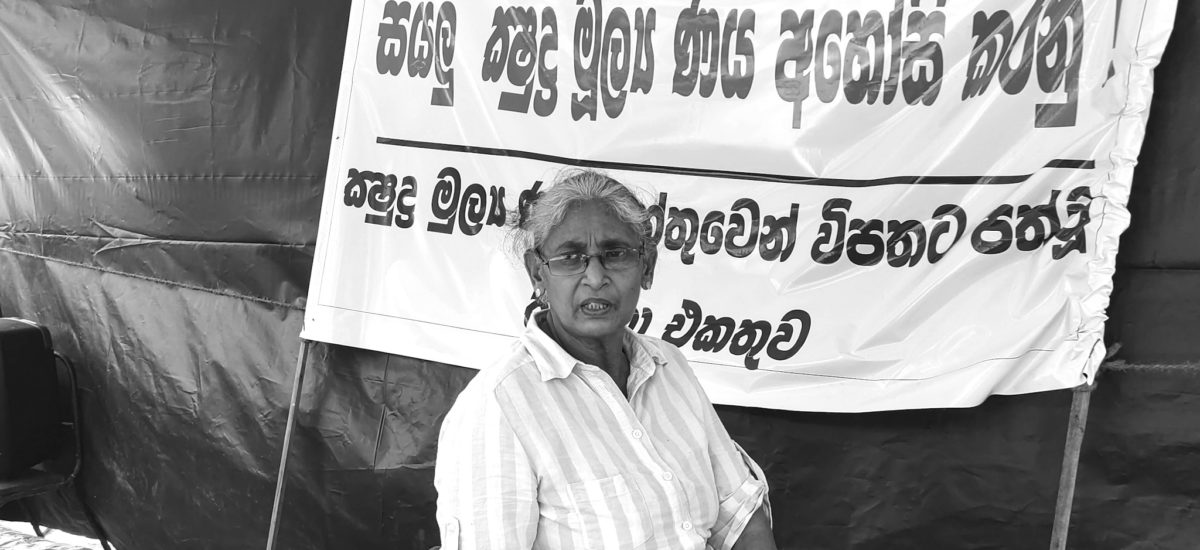Trapped between unscrupulous microfinance companies and duplicitous governments, Sri Lanka’s rural women farmers are drowning in debt. Over 200 have committed suicide, some with their young children; families have been wrecked and hard-earned possessions lost as they struggle to meet impossible demands made by big businesses intent on increasing their profit margins.
With the emergence of unregulated microfinance in the late 2000s, there are 2.8 million borrowers of whom 2.4 million are women. Interest paid ranges from 28 percent to 89 percent.
“In general, microcredit lending is based on the notion that, allowing access to credit will help women pull themselves and therefore, their families, out of poverty. Microcredit helps women establish a microenterprise, of which the income is expected to meet the consumption, education and health needs of their family members, especially the children. But these fundamental principles are eroding in the face of high competition among the lenders to reach the same pool of borrowers,” according to an indepth study on microfinance and its effects on women conducted by the Centre for Poverty Analysis in 2019.
“With only a few documents to be submitted and few cross-checks to ascertain the borrowing history of the client, the women are able to access the loans within an extremely short period of time – at times less than three days for women who are not first-time borrowers. Information regarding the forms they sign and the deductions made are not forthcoming in many instances. Furthermore, the forms are not always in their native language, preventing them from understanding the basic conditions of the credit facility,” the study said, adding that while the women were conversant with the installment schedule, they could not state the interest rate being charged by the microfinance companies.
Such low financial literacy as well as many other factors has resulted in many women, especially farmers, being unable to repay their loans and falling into desperate financial trouble.
Pushed to the wall, a group of women farmers from Polonnaruwa have been staging a continuous protest in Hingurakgoda since March 8. Their chosen protest site is a memorial set up by President Ranasinghe Premadasa in 1986 after one of his village awakening programmes featuring statues of kings and queens including King Parakramabahu whose magnificent tank, the Parakrama Samudra, was built to bring prosperity to his people by providing water for agriculture. Today, his descendants are in the depths of poverty and fighting to merely survive.
The women have proved to be a feisty lot, pushing back against microfinance companies that try to cheat them and take advantage of their low financial literacy. They are hardworking and principled and have gone to great lengths to repay as much as they possibly can. Some have fallen ill or have been unable to beat droughts and floods while others have been tricked into paying exorbitant interest rates.
They pinpoint the exact day the rot set in – July 22, 2018 – when, at a meeting in Jaffna, both then Prime Minister Ranil Wickremesinghe and his Finance Minister Mangala Samaraweera announced that all microfinance debt would be wiped out and instructed borrowers to stop repaying their loans. Mr. Samaraweera said interest rates would be capped at 30 percent. Many women did just that, only to be hammered with huge sums owing, plus penalties, down the road. On the campaign trail, President Gotabaya Rajapaksa made the same promise but to no avail. Nothing has been done to wipe out their debt burden; even the brief respite given during the Covid-19 pandemic lockdown has come back to haunt them with accumulated sums to be repaid immediately. Many are in debt to multiple microfinance companies after taking a second loan to repay the first one and a third loan to repay the second one. They are inundated with letters of demand and some companies have filed cases for the women to pay up.
The debt collectors, often young men, come to houses at 6 am and sit there all day. Sometimes it’s only the wife at home with the husband out to work. The neighbours talk and the husband gets suspicious, leading to tension in the home. Some women have pawned their jewellery, electrical items and other household goods to meet repayments. One said the hair on her arms stands on end when she hears a motorcycle go by. Others tell their children to lie and say they are not at home while heading out of the back door or they hide inside, reluctant to go out in case they run into the dreaded debt collector.
Studies have shown that women go to great lengths to repay their loans; it is a matter of honour for them unlike for men who often use the money to drink and gamble and cannot meet their obligations. The women farmers have been using their borrowings labourers’ wages, fertiliser and other agricultural inputs; it costs about Rs. 50,000 to cultivate one acre of land. The women in Polonnaruwa have not been buying consumer products or squandering the money away on celebrations, as some finance companies imply. Some have taken on other jobs such as stitching clothes or making food but again the pandemic has added to their woes.
There are four MPs for the Polonnaruwa district but none of them are concerned with the plight of their constituents. They go up and down the road in front of the site regularly in their large vehicles but do not stop to offer any solution or assistance.
Fed up with their lot, the women are determined to continue the protest until their demands are met. These include wiping out of all debt, ceasing debt collection until a debt audit is conducted and dropping legal action.
“It is like a cancer spreading throughout the country,” says Priyanthika Kumari, the leader of the Collective of Women Victims of Microfinance. Her family has mortgaged everything they have to repay their loans. “There is no end to paying these loans. Government banks only give money to big business people, not to us. They ask for documents that we don’t have and we have to have a regular job.
“This government gave false promises during election time to get our votes saying that they will wipe out our debt. President Gotabaya’s election promise was only a promise. Lives of innocent women are lost when company people come into villages and ruin people with lies and false information. They say we buy electrical goods and have parties with the money but I have only used it to cultivate my fields,” she says.
Anusha Damayanthi claims that interest is calculated in an arbitrary way. She was told it would be 18 percent but she has been paying 26 percent. With a penalty charge for not paying during Covid-19 and with interest being charged on funds including the penalty, the sum to be paid back has reached an unimaginable level. “I had to be in Colombo for a year to look after my sick husband who was in the Navy and suffered from a war wound. I took on sewing work but now there are no orders. I have three girls under the age of 18 and no way to pay for their education.
“We live in a rented house. We have no land of our own. I have no way to repay what I owe. I had to take a second loan to repay the first one. The company has taken a court case against me and sent me summons,” she says.
Janaki Sriyakanthi is determined to carry on with the satyagraha until the debt is wiped out for everybody. “This government gave us false promises. We were paying our loans until the previous government told us to stop although we were somehow paying them back. Now we are in difficulties because the accumulated amount is so much. How can we pay? The companies are getting big profits so until we have a solution, we will not stop,” she says.
The women do not want ad hoc measures such as money from private individuals but are determined to get a final solution to the microfinance debt problem facing women across the country.
Excerpts from interviews with victims are below:
Priyanthika Kumari from the Collective of Women Victims of Microfinance speaks about the burden and consequences of microfinance debt on women, including increased incidents of female suicide. Watch the full video below.


